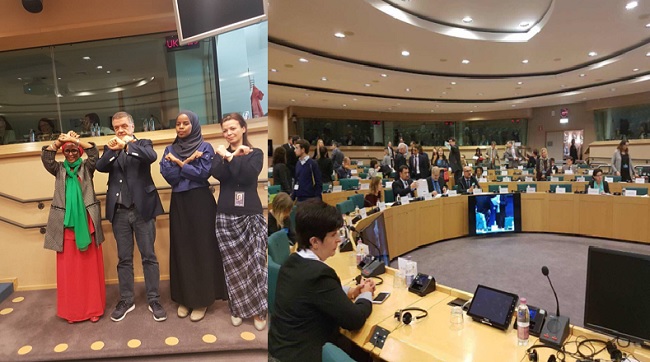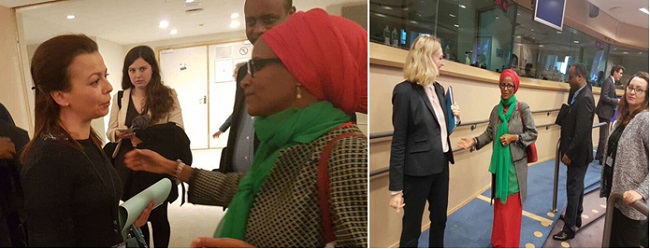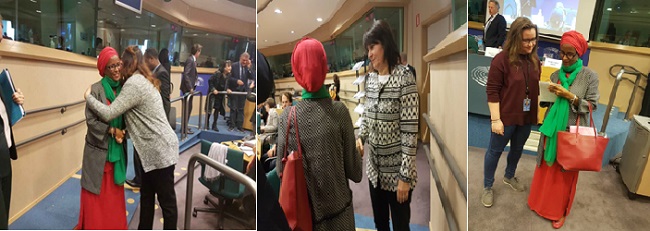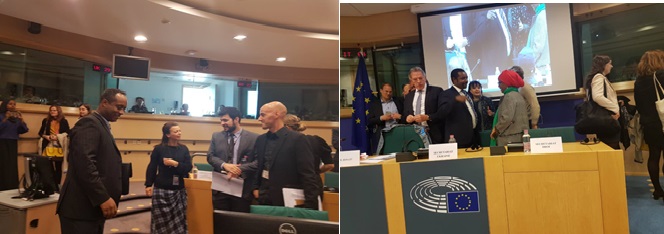Samiha Osman presentation
European Parliament Hearing
Brussels, Belgium
Thank your Excellency Chairperson,
Your excellencies member of the European Parliament, distinguished speakers, Dear participants, Ladies, and Gentlemen,
I extend my heartfelt thanks to the European Parliament Subcommittee on Human Rights (DROI) for Organizing this Hearing and giving me an opportunity to speak about the gender violence committed against women in Ethiopia in general and against Oromo women in particular. I am also grateful to all my informants, whom I spoke to them during my preparation for this speech on the atrocities they endured whom also morally supported other women survivors of sexual violence.

Ladies and Gentlemen,
I was born and grown up from an Oromo family in Eastern Oromia, Hararghe. I left my home village in 1977 at the age of five and this was during Ethio-Somalia war. The war between two was directly operating on our village. In addition, Oromo Liberation Front (OLF) established with the aim for the Oromo people to decide their political destiny through the referendum was also operating in our village to safeguard its principle against both. Consequently, our community became a battlefield and we were unable to survive, and my parents were forced to flee from our village to Somalia.
Since my childhood till today I have been exposed to get to know groups of women belonging to political and demographic minority, refugee, women living in rural, destitute women, women who were in detention, women affected by armed conflict and etc. those faced various sorts of sexual violence. I have little time, to sum it up, all.

Ladies and Gentlemen,
Cultural and traditional attitudes toward women in Ethiopia negatively affect their status and recognition in participating in the social, economic and political life. Around 85% of Ethiopians are living in rural areas. Rural people are less educated and have different Traditional practices that adversely affect the situation and rights of women, universally across the empire. Historically the making of the Ethiopian Empire has been characterized by the attempt to establish a single nation-state through violently annexing all other nations and nationalities. Oromos are among those nations and nationalities in Ethiopia victimized by this annexation. Since the fate of Oromo women is related to the future of their nation, they share all the political persecutions, economic oppression, and human rights abuses perpetrated against the Oromo people by the successive regimes. Therefore, the Oromo women are confronting twofold oppression both as a woman and as part of the nation.

Even though the harmful norms and traditional practices that affect the well-being of women and girls in Ethiopia have shown a declining trend, clamping down and discouraging of women activists in the political decision unless they are submissive to the ideology of ruling party it is incredibly worrisome. Consequently, women activists charged to death sentence, lifetime imprisonment, long time imprisonment, torture, killings, etc. by the Ethiopian government is rampant.

Ladies and Gentlemen,
Despite a broad spectrum of sexual violence in Ethiopia, there is a strong limitation to get enough information in Ethiopia. This is because of the fear of social exclusion by society, which will bring serious consequences. In addition to this, survivors are silent because they felt they would never achieve any redress. Indeed, no individual perpetrators such as soldier or security officer never been held to account.
Ladies and Gentlemen,
The Constitution of the Federal Democratic Republic of Ethiopia (FDRE) ratified in 1995, made all the international conventions part of the domestic law. Moreover, Ethiopia is a state party to the Convention on the Elimination of All Forms of Discrimination against Women (CEDAW). Article 35 of FDRE guarantees women not only full equality, but also preferential treatment. However, Ethiopian government always failed to comply with its constitution and covenants which it decorated on paper for the purpose of foreign aid. The current government of Ethiopia that clinch on power since 1991 has the human rights record that went on from bad to worst. Consequently, Ethiopian women prisoners of conscience who were held solely for the peaceful exercise of their right to freedom of expression and association are many to mention. However, I will mention some Oromos and other nationals as a sample out of many reported: –
1. Women political prisoners sentenced to death because of their political vision:
Asli Oromo: She was the first Oromo woman or the first female in Ethiopian Empire to be sentenced to death penalty for her political vision. Asli was in prison for more than 18 years (from 1992 to 2010). She was released in 2010 with the influence of international community and fled the country and is currently residing in Texas, USA. She was kept in cramped solitary room or toilets. She was interrogated and tortured by higher military and police officials such as General Samora (current Chief of commanding Staff of Ethiopian Defense Force) and others. She witnessed that in her stay in prison many Oromo women told her that before their arrival to the place they were gang-raped.
Urge Abebe: death sentence, her Husband Girma Ragassa is serving life imprisonment and her child, Bontu Girma 11-year old was also with Urge until very recently and now given to one of NGOs carrying such cases. Bontu’s family tragedy is common to many Oromos; thousands of Oromo children in which parents and elders with family were either killed, imprisoned, disappeared without trace or incapacitated amounting to death. Today suffering of many Oromo children under government caused destitution is everywhere in Oromia. Diribe Itana: death sentence and Dagu Itana Life imprisonment are brother and sister.
2. Women politicians sentenced to lifetime imprisonment because of their political vision: Birtukan Midekssa: first woman political party leader in Ethiopian history. Birtukan was elected to be a chairperson of the Unity for Democracy and Justice (UDJ). Birtukan was convicted of attempting to overthrow the constitutional order and sentenced to life in prison. After advocacy of international community, she was released and currently exiled to escape further harassment and residing in USA. Halima Abdi Mohammed and Zainu AbdoTamam are sentenced to lifetime imprisonment and are now held in Qaallitii.
3. Women Political prisoners sentenced for more than a decade: Bachuu Marga Fayisaa (18 years), Abarrash Yaadataa Naadoo (12 years), Adan Mohamed Abdullahii (12 years) and all currently in Qaallittii prison. Masarat Taaddasee (Hawwii) after she was sentenced to 15 years later reduced to 5 years and released, but due to surveillance of security force, she decided to leave the country to neighboring country Nairobi, Kenya. Chaltu Takele Abetu after 12 years prison service rearrested in 2016.
Reeyot Alemu is an award-winning Ethiopian journalist falsely charged with terrorism and sentenced to 14 years later reduced to five years after intervention of international community.
4. Women kept in prison by reversing of court rule: Dinkinesh Dhereessaa: Currently residing in Washington D.C USA who was a long-time prisoner in Karchale and known to many human rights advocators in which the court ruling was reversed by officials of the government.
5. Torture or ill-treatment: Torture and ill-treatment have been used by Ethiopia’s police, military, and other members of the security forces to punish perceived dissenters, including university students, members of the political opposition, and alleged supporters of insurgent groups. Oromo artists like Hawwii Tazarraa, Seenaa Solomoon, Diribee Gadaa, Makiyaa Ibrahim, Do’ii Ittaanaa, Obsineet Baqqalaa, Haannaa Adam, Boontuu Dhaqqabaa, Qananii Girmaa, and etc. are some out of many victims of torture. Some like Seenaa and Makiyaa are still in prison.
6. Rape in the area of insurgent zones: Generally in Ethiopia gang rape is used as a form of torture against the victim to threaten them or their relatives, to humiliate and demoralize the women and the people, as punishment for the alleged activities of her parents or to coerce her into giving information. Pre-trial rape in detention centers, Military camps, and unofficial prisons against women is one of the frequent patterns of abuse by the security agents, soldiers and police officers of the government involving commanding officers. It is often intended to terrorize the population, break up families, and destroy communities. In rural areas where armed forces against the regime are operating, after any combat the soldiers collect young girls and women and gang raped them in front of their relatives, fathers, brothers, and husbands. The ongoing act of Liyyuu Police in Ogaden and Oromia regional zone is a typical example to be mentioned.
Ladies and Gentlemen,
I communicated with one of the victims of sexual aggression committed to her by members of Ethiopian defense force. Aaddee Urjii Dhaabaa is currently residing in Colorado, USA. Since 1993 until 2005. In our communication, she said: I was raped at every place of prisons now and then by six to ten armed forces every day. They repeatedly gang-raped her every night until she could no longer walk. She told, they inserted broken beer bottle into her genital body. She subsequently developed a fistula and has urinary incontinence currently using diapers for her daily life. Twelve years later the same government committed the same atrocities to many Oromo women during the state of emergency in 2016/2017.
7. Sexual aggression in Refugee Camps: Thousands of Oromos fled from Oromia leaving their families and possessions to neighboring countries to escape threats to their lives committed against them by the government of Ethiopia. However, as a result of lobbying and the intergovernmental relation of Ethiopia’s government with neighboring countries, the Oromo are faced with similar prejudices and discrimination in all refugee camps in countries of asylum by security agents of the Ethiopian government and hosting country. Among others ongoing mistreatment and massive refoulment from Somalia, Somaliland and Djibouti need the intervention of the international community.
8. Women still in detention as a result of state of emergency: A few to mention are: Sabboontuu Bayyanaa Waddeessoo, Ayyalech Abbabe, Qananii Taammiruu Jifaar, Seenaa Solomoon, Makiyaa Ibrahim and Chaltu Takele Abetu, Caaltuu Dhugumaa, Obsee/Tigist/ Taayyee, Darartuu Abdataa, Urgee Usmaan Ammee, Maazoo Abdoo Alii, Beektuu waqwayyaa, Siinxoo, Obsee, Dirribee, Dastaa Mitikkuu, still in detention because of since 2015 on going protest.
9. Oromo Women that have been killed or wounded by excessive force during last two years protest: There are numerous Oromo women activists reported that have been killed in different part of Oromia by Agazi force during Oromo protest of 2015/2016. To mention some:
- Alamnesh Mangashaa, West Shawaa, Ilfataa village – killed by Agazi faeces in December 12.
- Caaltuu Taaddasaa west Shawaa, Jalduu – killed by Agazi forces in December 13, 2015.
- Galaanee Beekkannaa west Shewa, Gincii killed by Agazi forces in December 13, 2015.
- Baalee Kirkiraa South Shewa, Ammayyaa killed by Agazi force in December 13, 2015.
- Naatoo Gulummaa WestShewa – killed by Agazi force in December 15, 2015.
- Sirnee Guddataa Qellem Wallaggaa, Caanqaa and her child Isheetuu Fedhasaa – killed by Agazi force in December 17, 2015,
- Shaashituu Mokonnin Horroo Guduruu, Wallagga six month pregnant – killed by Agazi forces in December 21, 2015.
- Qananiituu Fiqaaduu, Horroo Guduruu Malaga cousin of Shaashitu Mokkonnin – killed by Agazi force in December 21, 2015,
- Dassituu, West haragehe, Machaaraa – killed in February 22, 2016 by Agazi force.
Ladies and Gentlemen,
To sum up, women should be empowered to have equal rights in the social, economic, and political affairs of the country. Sexual violence has serious consequences for women’s physical and mental health. Survivors of sexual abuse often suffer from short-term and long-term consequences about their health, psychological well-being, and social integration. It hinders their self-steam and causes depression. It also causes injury, disability HIV infection and other sexually transmitted diseases. It is clear that changing international and national laws are significant steps towards finding lasting remedies and ending sexual violence in Ethiopia. However, this cannot be achieved unless the Ethiopian government abides to its constitution and implement the principles set in and resolve the deep-rooted political conflicts. Hence, I recommend:
- The ultimate remedy for politically motivated sexual aggression is to exert pressure on the Ethiopian government to solve the deep-rooted political conflict of the empire by respecting the right of people to self-determination that paves the way to build a broadly-based peace through the initiative and ownership of the people themselves.
- EU needs to exert a diplomatic pressure on Ethiopian government to end impunity for perpetrators of sexual violence and seek justice for victims.
Peace shall prevail,
Thank you,
